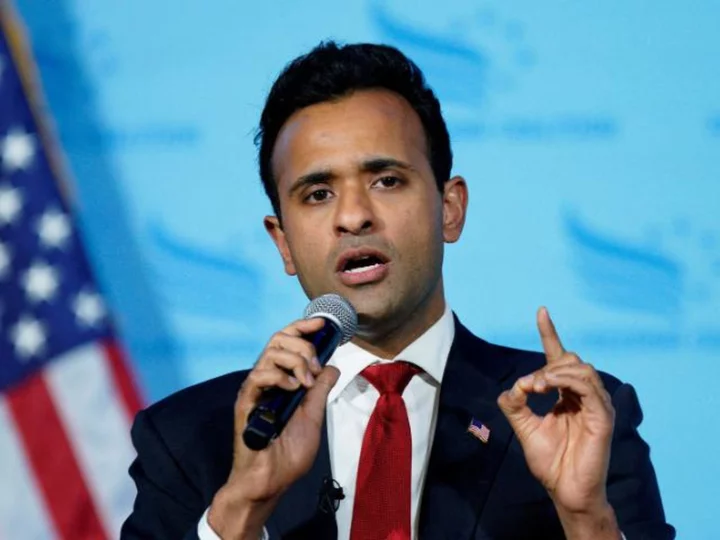For at least the third time in the last two weeks, Republican presidential candidate Vivek Ramaswamy has falsely described something he wrote before he launched his campaign.
The three false claims have something in common. Ramaswamy made all three as he tried to distance himself from his past criticism of former President Donald Trump, the dominant frontrunner in the race for the 2024 Republican nomination.
Ramaswamy made the latest claim during a combative Wednesday interview with MSNBC host Mehdi Hasan. Hasan brought up a tweet from January 12, 2021, six days after a pro-Trump mob attacked the US Capitol, in which Ramaswamy wrote, "What Trump did last week was wrong. Downright abhorrent. Plain and simple." Hasan asked him to specify what Trump did that was "downright abhorrent."
Ramaswamy, refusing to answer directly, said, "Let's actually be really fair to your audience. So on January 10, 2021 -- thereabouts, days after that incident -- I wrote an op-ed in The Wall Street Journal arguing that censorship was the real cause of what happened on January 6." After Hasan responded, "Which isn't true, but yeah," Ramaswamy continued: "Well, that's what I wrote, I'm giving you the facts of what I said; that's a hard fact, that was published in The Wall Street Journal."
But it wasn't.
Facts First: Ramaswamy's claim is false. He never argued in The Wall Street Journal op-ed that censorship was the real cause of the January 6 riot. Rather, Ramaswamy and his co-author criticized social media companies for banning Trump and some of his supporters in the days after the riot. They argued that social media companies are violating the Constitution when they censor users, and they warned that Silicon Valley stifling the voices of disaffected Americans would lead to future "terror" that would make the Capitol riot look peaceful by comparison. They never argued in the op-ed that censorship was even a partial cause of the January 6 riot -- which they described as "disgraceful," "last week's horror" and "a stain on American history" -- let alone its primary cause.
Ramaswamy campaign spokesperson Tricia McLaughlin quickly provided CNN with a link to the op-ed when we asked on Wednesday night what piece Ramaswamy had been referring to on MSNBC. McLaughlin did not respond further, though, after we told her that the piece did not contain the argument that Ramaswamy claimed it did.
A recent pattern
Ramaswamy, a businessman, has a recent pattern of inaccurately describing his own pre-campaign commentary related to Trump, whom he now describes as "the best president of the 21st century."
Ramaswamy's previous two false claims about his writings were about the contents of his 2022 book, "Nation of Victims," in which he criticized Trump at length for insisting that the 2020 election was stolen.
At a Republican debate in August, Ramaswamy falsely denied that the book was more negative about Trump than he was at the debate. Four days later, when he was asked in an NBC interview about the book's denunciation of Trump's stolen-election tales, he falsely claimed that the same book included "about 20 pages" of discussion about how "big tech" had interfered in the election. In fact, the book did not address that topic on any page, though a book he published in 2021 did.
Ramaswamy also falsely claimed in late August that he had been misquoted by The Atlantic when it published controversial comments he made about the terror attacks of September 11, 2001. The magazine soon released an audio recording that proved he had been quoted accurately.
What the Wall Street Journal op-ed said
Ramaswamy's Wall Street Journal op-ed, co-authored with Yale Law School professor Jed Rubenfeld, was published online on January 11, 2021, and in print the next day under the headline "Save the Constitution From Big Tech." After noting that Twitter and Facebook had halted Trump's ability to post after the Capitol riot, and that Google, Apple and Amazon had booted a right-wing social media app used by some Capitol rioters, Ramaswamy and Rubenfeld made the case that "Google, Facebook and Twitter should be treated as state actors under existing legal doctrines," not as mere private parties, and that these companies are in breach of Americans' First Amendment free speech rights when they censor users.
But nowhere in the piece did they assert that such censorship had caused the events of January 6. Here's the section of the op-ed most relevant to Ramaswamy's claim on MSNBC:
"Hard cases make bad law, and Mr. Trump presented America with a hard case last week. The breach of the Capitol is a stain on American history, and Silicon Valley seized on the attack to do what Congress couldn't by suppressing the kind of political speech the First Amendment was designed to protect.
There's more at stake than free speech. Suppression of dissent breeds terror. The answer to last week's horror should be to open more channels of dialogue, not to close them off. If disaffected Americans no longer have an outlet to be heard, the siege of Capitol Hill will look like a friendly parley compared with what's to come."
That's just not the argument Ramaswamy described on MSNBC.

